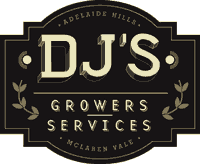Irrigation & fertiliser application: Irrigation is needed. Without extra water, the health of your vines suffers, and your irrigation system and schedule need to be maintained. There is a technique available to make vines drop fruit, spraying with ethephon, which will reduce the vines demand for water.
Fertiliser can be somewhat skipped. Vines are generally efficient with nutrient uptake, and going a season or two without supplementary feeding is an acceptable practice.
Weed and Disease Control can’t be skipped: You are going to need to undertake some basic weed control (for fire risk and to limit competition with your vines) and disease control, believe me, you do not want to let Powdery Mildew levels build up in your vineyard, even for a single season. There are techniques to limit the amount of Powdery Mildew that builds up using only a minimum of fungicidal sprays. Agronomic advice can help with this.
Downy Mildew and Botrytis levels building up are less of a concern. The next growing season, 2023/24, is forecast to have an El Nino weather pattern which generally reduces disease pressure for Downy Mildew and Botrytis.
Budget for your plan: You'll need to develop a budget that accounts for ongoing expenses, such as property taxes, insurance premiums, and the necessary maintenance costs. Ensure that the allocated funds sustain the vineyard during the dormant period.
If you are going to Mothball; why not renovate instead?
Consider taking this time to cut back to the crown and rework your vines. This maybe the ideal time to undertake remedial surgery for Eutypa lata (dead arm) removal. This process takes two seasons, with the vines having 3/4 of a normal crop in the second year. If you re-worked your vineyard now, then they would skip Vintage 2024 and have some fruit for Vintage 2025, before “normal” crop levels in Vintage 2026. This timeline, speculating with a best guess, would fit the demand for wine if exports resume into the Chinese market during the next year or so.
















